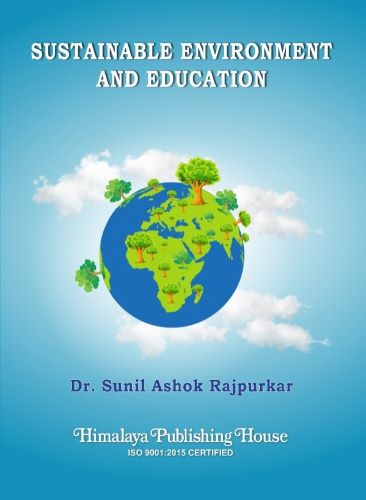The book “Sustainable Environment and Education” is an attempt to avail of simplified contemporary information on the subject of Environment, Sustainability, and Education to the students and teachers of Environmental Studies and Environmental Education. It singularly covers major syllabus of Environmental Education for the B.Ed. program of University of Mumbai but it also caters to the Environmental Studies and Environmental Education syllabi for Undergraduate programs as well as B.Ed. and M.Ed. degree programs of other Universities across India.
The book includes the most scientific and authentic information based on a number of reference sources including Encyclopaedias of Ecology and Environment, books on Environmental Education, latest articles on the subject from newspapers/journals/magazines and web references integrated with the academic experiences of the author as an educator. Use of scientific terminologies, lucid explanation with day-to-day examples is the peculiar feature of this book. It thus, tries to cover the pervasive concept of Environmental Sustainability holistically in a nutshell but with the required depth.
Contents –
1. Environment and Ecology
– Concept of Environment and Its Components
– Concept of Ecology, Food Chain and Food Web
– Ecosystem and its Types
– Ecological Pyramids
– Ecological Energy Dynamics and Progressive Loss of Energy
2. Environmental Issues
– Climate Change
– Loss of Biodiversity
– Biomagnification
– Eutrophication
– Urban Sprawl
– Genetic Engineering
3. Ecological Energetics and Concept of Pollution
– What is Environmental Pollution?
– Origin of Environmental Pollution
– Environmental Pollution – A Barrier to Developmental Process
– Concept of Pollution in Context to Loss of Energy
– Pollution in Man-made Systems and Loss of Energy
– Significance of Steady-state Principle in Ecological Systems for Sustainable Development
4. Sustainable Development
– Concept of Sustainable Development
– Need and Significance of Sustainable Development
– Sustainable Practices and Sustainable Habits
– Measures to be Taken for Sustainable Development
5. Sustainable Environmental Management
– Concept of Sustainable Environmental Management
– Process and Functions of Sustainable Environmental Management
– Significance of Sustainable Environmental Management
– Sustainable Environmental Management Practices
(A) RainWater Harvesting
(B) Mangroves Management
(C) Solid Waste Management
(D) Indigenous Technical Knowledge
6. Environmental Monitoring and Assessment
– Environmental Impact Assessment
– Environmental Audit
– Disaster Management
7. Global Efforts for Environmental Conservation
– Environmental Conferences, Commissions and Summits at the International Level
1. UNO’s Stockholm Conference on Human Environment, 1972
2. UNESCO’s UNEP-IEEP, 1975
3. Intergovernmental Conference EE, Tbilisi, 1977
4. Brundtland Commission, 1985
5. Montreal Protocol, 1987
6. Rio Summit / Earth Summit, 1992
7. Rio +5, 1997
8. Montreal Declaration on Environmental Education from Planet ‘ERE’ Forum, 1997
9. World Summit / Rio +10, Johannesburg, 2002
10. Kyoto Protocol, 2005
11. Tbilisi +30, Ahmedabad, 2007
12. UN Conference on Sustainable Development / Rio +20, 2012
13. UN Sustainable Development Summit, New York, 2015
8. Environmental Education
– Environmental Education – Meaning and Concept
– Environmental Education – Goals and Objectives
– Guiding Principles of Environmental Education
– Nature, Characteristics and Scope of Environmental Education
– Need and Significance of Environmental Education
9. Environmental Education Through School Curriculum
– Importance of Environmental Education Under Sustainable Environmental Management
– Approaches to Environmental Education
– Correlation of Environmental Education with School Subjects (Separate Subject Approach)
– Integrating Environmental Education Through Curricular and Co-curricular Activities (Integrated Approach)
10. Environmental Movements
– Chipko Movement
– Narmada Bachao Andolan (Save Narmada Movement)
– Silent Valley Movement
– Anna Hazare’s Ralegan Siddhi Movement
– Environmental Initiatives of Tarun Bharat Sangh
11. Government Efforts for Environmental Protection and Conservation
– Project Tiger
– Ganga Action Plan
– The Wildlife Protection Act, 1972
– The Environment Protection Act, 1986
– Noise Pollution Act (The Noise Pollution Regulation and Control Rules, 2000)
12. Religious Background of Environmental Philosophy
– Religious Beliefs Emerging from Environmental Philosophy
– Environmental Philosophy Reflected through some Major Religions of the World
1. Hinduism
2. Buddhism
3. Jainism
4. Sikhism
5. Islam
6. Christianity
– Significance of Religious Values in Today’s Times that are Beneficial to Our Environment
Bibliography






